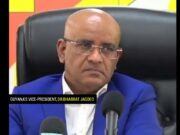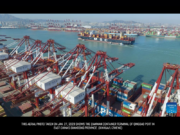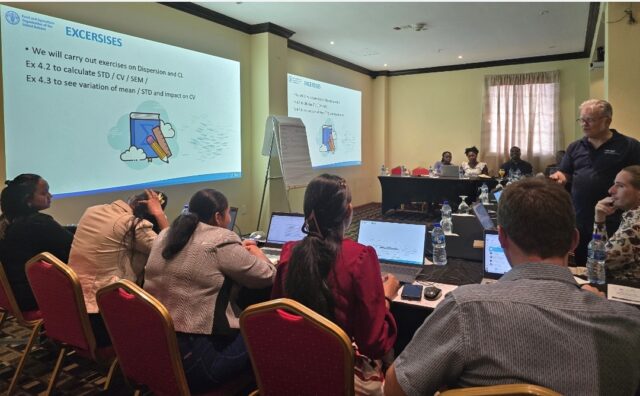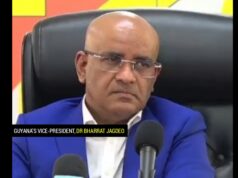A regional training workshop on fisheries statistics and data analysis is underway in Guyana, running from November 11 to 21. The initiative aims to enhance the capacity of fisheries professionals from Guyana, Suriname, and Trinidad and Tobago, equipping them with advanced techniques to improve data collection and analysis in the fisheries sector.
“This training is essential for fisheries officers and extension workers to understand advanced methods for collecting quality data, particularly from remote or difficult-to-access fishing communities along the coastlines of Guyana, Suriname, and Trinidad and Tobago,” said Yann Laurent, Head Trainer from the Food and Agriculture Organization of the United Nations (FAO).
Dr. Laurent emphasized that reliable data on catch volumes, fishing frequency, and other activities is critical for monitoring national fishing activities and forming the basis for evidence-based policymaking.
By the end of the programme, participants will be able to estimate official fish population statistics using the CALIPSEO digital data collection system. The upgraded system will enable more precise, timely, and trusted reporting to support sector policies, studies, and sustainability efforts.
Participants are learning both theoretical concepts and practical skills, including statistical software and sampling techniques. These tools are expected to enhance data accuracy and modernize fisheries management.
Gaushimi Poeran, a participant from Suriname, highlighted the significance of the training: “The small-scale fisheries sector in Suriname is growing rapidly, and it’s crucial for us to improve our data collection to meet international standards. With FAO’s best practices, we now have better tools to improve and deliver data in a more quantitative way.”
Similarly, Lara Ferreira, Fisheries Officer from the Trinidad and Tobago Fisheries Division, noted the value of the training: “This program is enhancing our skills in fisheries data collection, storage, and analysis, leading to better-informed decision-making. A representative from Tobago is also here, and we’re working together to integrate data from both islands.”
Desha Husbands Spellen, from the Guyana Fisheries Department, explained that the introduction of the CALIPSEO system has significantly improved data management. “Previously, data collection and storage were time-consuming and labor-intensive. Now, we can consolidate data from various sub-divisions and produce more specific reports and estimates, enhancing efficiency,” she said.
The workshop, organized by the Guyana Fisheries Department in collaboration with the FAO, the University of the West Indies (UWI), and the EU-funded FISH4ACP program, is a crucial step toward sustainable fisheries management in the region. It supports improved food security, better livelihoods for small-scale fishers, and the long-term sustainability of the sector.
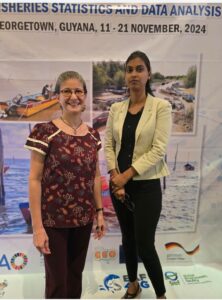
This training represents a collaborative effort to modernize fisheries practices in the Caribbean, ensuring that the sector continues to thrive while meeting global standards.


